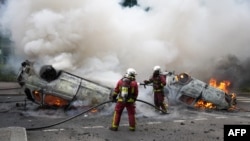Escalating violence following the death of a French teenager is stirring memories of 2005 riots that rocked France, amid longstanding accusations by critics of police violence that disproportionately targets youngsters from marginalized neighborhoods.
On Thursday, thousands of people marched in the working-class Paris suburb of Nanterre, two days after a police officer shot 17-year-old Nahel M. at a traffic stop there.
“Justice for Nahel,” protesters chanted during the march, led by the teen’s mother. Some brandished signs reading, “Police kill,” during a demonstration that began peacefully but was later punctuated by violence.
The policeman received a preliminary charge of voluntary homicide Thursday and was placed in provisional detention. His lawyer, Laurent-Franck Lienard, told France’s RTL radio the officer acted within the law.
Police sources initially suggested the teen had been shot as he rammed his car into two officers who detained him for a traffic violation. But a video posted on Twitter — reportedly taken by an alleged witness — told another story.
It shows two officers questioning the driver of a yellow car. One then shoots toward the driver at point-blank range as the car pulls away.
On Thursday, Nanterre prosecutor Pascal Prache said the legal conditions for the officer’s use of force “have not been fulfilled.” He also said the teenager had been known by police for refusing to comply with traffic stops.
The incident has triggered a fierce backlash around the French capital and elsewhere in the country. The past two nights have seen protesters clashing with police, setting cars, town halls and trash cans on fire, and ransacking stores.
French authorities are mobilizing 40,000 police officers countrywide – including 5,000 in Paris alone - to respond to more unrest feared Thursday night. Some public transportation is stopping early, and at least one Paris-area town announced a curfew.
“The state must be firm in its response,” said Interior Minister Gerald Darmanin.
The mounting unrest feeds into a longstanding debate — and anger — about policing, especially in the country’s poor, ethnically diverse towns.
In 2020, tens of thousands of French joined global demonstrations against police violence following the death of George Floyd in police custody in the United States. Many then saw similarities to Adama Traore, another Black man, who died in police custody in France a few years before. Traore’s sister joined Thursday’s protests in Nanterre.
In 2005, the death of two teens as they escaped from police in a Paris suburb unleashed nationwide rioting.
Relations ‘broken’
“Relations are broken” between the police and youngsters, said Aboubacar N’diaye, co-founder of a youth association in Bobigny — one of the low-income, ethnically mixed suburbs ringing Paris, known here as the banlieues.
The town, too, has seen an increase in violence in recent days. N’diaye largely blames police for the tensions — and the media for feeding negative perceptions of banlieue youngsters.
“Police are supposed to ensure our safety,” N’diaye said, “but instead people are afraid. Young people are afraid of the police, and the police are afraid of the youngsters.”
Police officers also have denounced rising violence on the job, especially in tough neighborhoods. The dilemma experienced by both sides — police and youngsters — was captured in an acclaimed 2019 French crime thriller film, “Les Miserables.”
“The death of 17-year-old Nahel … is a drama susceptible to inflame the countryside, from the banlieue to the National Assembly,” according to the regional newspaper L’Alsace in an editorial. It carries lessons both for the disproportionate use of force by some officers, the newspaper said, but also “a sentiment among some youth that delinquency is a trivial game without consequence.”
French President Emmanuel Macron has called this latest bout of unrest “unjustifiable” — but also Nahel’s death ‘inexcusable.” His prime minister, Elisabeth Borne, urged calm but said the current situation does not merit declaring a state of emergency.
Action needed
Meanwhile, rights groups and the leftist opposition NUPES party are demanding the reversal of 2017 legislation giving police officers greater powers to use their weapons.
Since the measure was passed, the number of police shootings has jumped by 40 percent, reports say, with 13 people killed last year alone for refusing to stop for traffic checks.
“Outrage is not enough, there must be action,” the French Human Rights League said in a statement. “False declarations that sustain police immunity are intolerable.”
“There is no question of downplaying the pressures faced by police officers in the face of rising aggression,” France’s respected Le Monde newspaper wrote in an editorial, even as it called for “a thorough overhaul of the conditions under which police officers use their weapons.”
French police unions have offered a fractured response. Some denounced “anti-cop” sentiment and said the officer suspected of firing on the teen had a right to be presumed innocent “like all French citizens.”
The right-wing France Police union cheered the officer who had fired at the Nanterre teen. “The only ones responsible for the death of this thug are his parents, incapable of educating their son,” the union tweeted.
Interior Minister Darmanin said he would take legal action against the union, calling for its dissolution.






